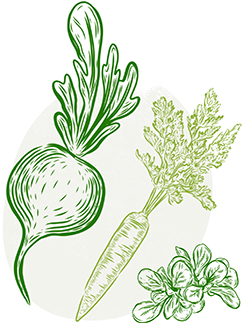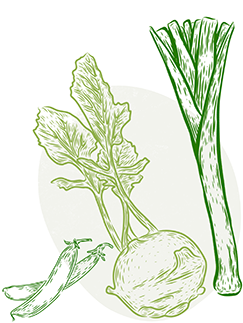The community, health and environmental value of allotments
Allotments are valuable community assets, boosting health & wellbeing, providing sustainable growing spaces and creating biodiverse green corridors. Not only are they a valuable part of our UK heritage, but they play an important part in our future too.
Rich green spaces
Historically seen as simply spaces for individuals to enjoy, studies increasingly show the green value of allotment sites. Allotments are rich in biodiversity, creating green spaces for wildlife and pollinators throughout the country.
The quality of soil on allotments creates a unique environment from which all life can emerge – particularly precious in urban areas. Even in rural areas, the ecological value of sites per square metre, surpasses that of adjoining industrial farmed agricultural land.
Natural England acknowledges allotments as a firm part of 'Green Infrastructure' – a network of connected green features in the landscape that play an important role in urban and rural environments. They improve health and wellbeing, air quality, biodiversity, nature recovery and resilience to and mitigation of climate change. For more information see Natural England's website and learn about the importance of Green Infrastructure.
Natural England, Green Infrastructure >
Social and community
Far from being useful only to plot holders, allotments are increasingly used for the benefit of wider communities. There are some outstanding projects taking place on allotments sites up and down the country who are allocating spaces for community, educational, disability and social prescribing projects.
From community open days to educational projects, to community hubs offering workshops, mental health projects, food sharing schemes, sensory gardens for those with disabilities, collaboration with community payback schemes and green social prescribing by GPs – the beneficial community uses for allotment sites are immense.
Allotments have a huge educational value too - offering the chance for those without large gardens to learn how to grow their own and gain knowledge from the experienced allotment community. Allotments offer a rich natural learning environment away from classrooms. Many sites run primary and secondary educational projects in conjunction with local schools and clubs, teaching young people about nature and the value of growing.
Health and wellbeing
There is a growing awareness of the role that gardening plays in improving mental health. Many allotment gardeners will tell you that a spell on the plot nurturing plants and contemplating nature makes them feel calmer and more hopeful and there have been recent studies that have measured this benefit.
In 2018 the UK Government produced a 25 Year Environment Plan, which acknowledges that connecting people to their environment will also improve their health and well-being.
The social contact offered by gardening in an allotment environment helps to combat the lack of social capital embodied by loneliness, which has the equivalent risk to health as consuming 15 cigarettes daily and is twice as harmful as obesity. A study in the Netherlands showed that every 10 per cent increase in exposure to green space translated into an improvement in health equivalent to being five years younger, with similar benefits found by studies in Canada and Japan.
The physical benefits of regular spells of gardening help plot-holders to keep fit even if they have sedentary jobs. The twisting and turning involved in gardening helps to maintain good gait and balance in older gardeners and also helps with cognitive decline.
Getting outside is also good for us. Depending on your skin type, spending just 15-90 minutes a day out in the summer sunshine can build up your levels of immune boosting vitamin D.
The personal value of growing your own
If managed properly, an allotment can produce enough food to supplement a family's weekly shop, with fresh fruit and vegetables over the year. Allotment gardeners can choose to garden organically and avoid ingesting chemicals that are likely to be present on shop bought fruit and vegetables.
In a survey of National Allotment Society members nearly every person said their love of allotment gardening comes from the fresh air, home grown produce, healthy lifestyle and like-minded people this activity offers.
As many new plot-holders discover, growing vegetables requires acquiring new knowledge and skills and the satisfaction gained from eating their first home grown tomato or new potato makes them taste even more delicious!


